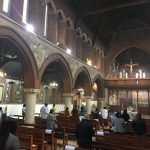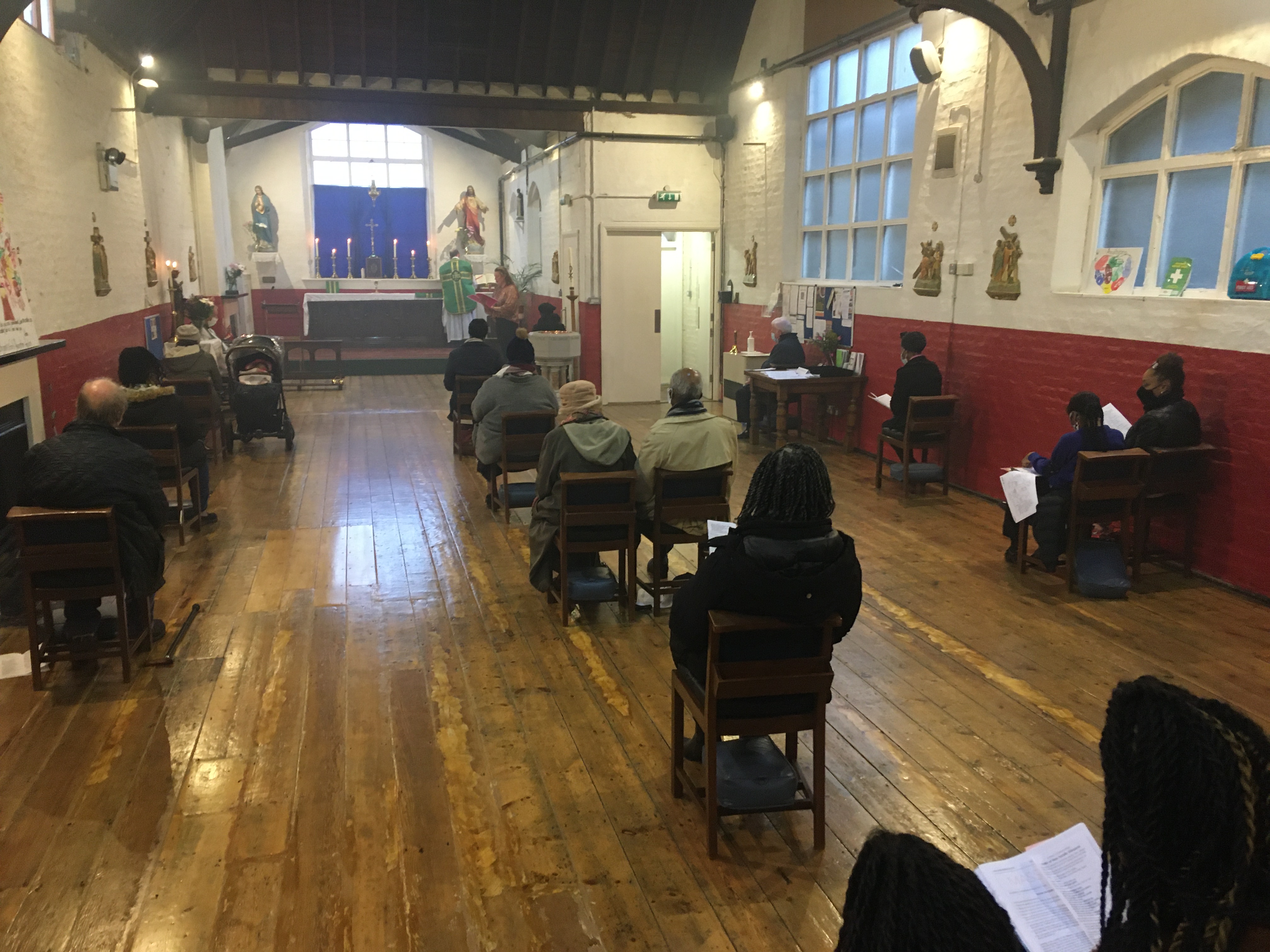29th of the Year, 17th Oct 21
The first reading today from Chapter 53 of Isaiah prophecy foretells of the Suffering Servant who is, of course, the Christ who offers His life upon the cross as the perfect sacrifice for all humanity for, as Isaiah writes: `By his sufferings shall m y servant justify many, taking their faults on himself.” It is for this reason, then, that the writer of the Letter to the Hebrews – and we still do not know who wrote that most important of letters which explain the nature of the Eternal High Priesthood of Jesus Christ – we find the words in Chapter 4 verse 16: `Let us be confident, then, in approaching the throne of grace, that we shall have mercy from him and find grace when we are in need of help.`
Have you ever thought, when pondering the gospels, of what Our Lord`s closest disciples, the ones he appointed Apostles, were really like ? James and John the sons of Zebedee were, it seems, both arrogant and pushy. We need to remind ourselves, perhaps, that in verses 30 to 32 of chapter 9 of St. Mark`s Gospel we find that Jesus had told the Twelve that “The son of Man is to be betrayed into human hands, and they will kill him, and three days after being killed he will rise again.” We are told that they didn`t understand and, in spite of the fact that Jesus had been with them and having them share his ministry for some three years they had turned a deaf ear to what he was saying. Again, just before today`s story of the pushy brothers, in chapter 10 verses 32 to 34 Jesus, on the road up to Jerusalem, he took the twelve aside to explain what was to happen to Him in rather graphic details. Yes, today we find the brothers pushing themselves forward by saying, `Master, we want you to do us a favour.` Of course Jesus asks what the favour is that they want from him and, pushing themselves above the rest they petitioned, `Allow us to sit one at your right hand and the other at your left in your glory.` Their lack of perception and sheer arrogance is hard to understand. Saint Matthew in his Gospel at chapter 22 and verses 20 and 21 we find a slightly different account for it is Mrs. Zebedee, the mother of James and John, who asks that her boys to be granted the prime positions in the new Kingdom of Jesus!
In both accounts Jesus tells James and John that they do not know what they are asking and then asks the question: `Can you drink the cup that I must drink, or be baptised with the baptism with which I must be baptised ?` Their answer is in the affirmative and then, of course, Jesus tells them that they will indeed drink of the cup that He must drink and be baptised with the baptism with which he is to be baptised, not the baptism of the Jordan but the baptism of his own blood upon the cross! He then says, very firmly, that the seats on his right hand and on his left in His kingdom are NOT his to grant for they belong to those to whom they have been allotted.
It is hardly surprising that when the other ten, who were clearly present on this journey up to Jerusalem, heard the request of these two, were beginning to feel indignant with James and John.
Jesus calls the Twelve to him and teaches them how they are to behave as followers of his and begins by likening pagan so-called rulers are those who lord it over others, particularly those over whom they are set and, clearly, it was just so for those under the rulers both of the Temple and the occupying secular power of Rome as they made their authority felt. He then goes on to say, 1This is not to happen among you. No; anyone who want to become great among you must be your servant, and anyone who want to be first among you must be slave to all.` And continuing the theme which we referred to as he had taught the twelve concerning his death and resurrection, we find Him saying, `For the Son of Man himself did not come to be served but to serve, and to give his life as a ransom for many.`
James, the brother of John, we find in the 12th Chapter of the Acts of The Apostles where we find that in AD44 he was beheaded as we read the words: “About that time Herod Herod Agrippa, the king, laid violent hands on some who belonged to the church ( including James who was the local Bishop of Jerusalem) He killed James the brother of John with the sword, and when he saw that it pleased the Jews, he proceeded to arrest Peter also. So James was the first Apostle to be martyred.
We know from John`s Gospel chapter 19, verses 26-27, that it was John who took Mary, the Mother of the Lord, into his own home adopting her, as it were, as his own mother. He preached in Jerusalem and very likely soon afterwards became Bishop of Ephesus in what is now western Turkey and worked among the churches of Asia Minor. It would seem that in the reign of either the Emperor Nero or the Emperor Domitian that he was banished to the Island of Patmos where he was assigned to slave labour in the mines. It seems that he was subsequently freed and died a natural death at Ephesus in about the year AD100. Today there is a very ancient place of worship, known as the House of Mary, on a mountain above Ephesus, where both Christians and Muslims worship – and as so often, where Mary has been or appeared, there is a spring of water flowing out from beneath that House.
Both James and John suffered greatly and indeed drank of the cup which our Lord drank and were likewise baptised in the baptism with which He was baptised.
We too are called to share in the suffering of Jesus and his Church so let us ask the Holy Apostles James and John the Sons of Thunder, for their prayers that we may have courage I our faith in our own time.
Amen.
Have you ever thought, when pondering the gospels, of what Our Lord`s closest disciples, the ones he appointed Apostles, were really like ? James and John the sons of Zebedee were, it seems, both arrogant and pushy. We need to remind ourselves, perhaps, that in verses 30 to 32 of chapter 9 of St. Mark`s Gospel we find that Jesus had told the Twelve that “The son of Man is to be betrayed into human hands, and they will kill him, and three days after being killed he will rise again.” We are told that they didn`t understand and, in spite of the fact that Jesus had been with them and having them share his ministry for some three years they had turned a deaf ear to what he was saying. Again, just before today`s story of the pushy brothers, in chapter 10 verses 32 to 34 Jesus, on the road up to Jerusalem, he took the twelve aside to explain what was to happen to Him in rather graphic details. Yes, today we find the brothers pushing themselves forward by saying, `Master, we want you to do us a favour.` Of course Jesus asks what the favour is that they want from him and, pushing themselves above the rest they petitioned, `Allow us to sit one at your right hand and the other at your left in your glory.` Their lack of perception and sheer arrogance is hard to understand. Saint Matthew in his Gospel at chapter 22 and verses 20 and 21 we find a slightly different account for it is Mrs. Zebedee, the mother of James and John, who asks that her boys to be granted the prime positions in the new Kingdom of Jesus!
In both accounts Jesus tells James and John that they do not know what they are asking and then asks the question: `Can you drink the cup that I must drink, or be baptised with the baptism with which I must be baptised ?` Their answer is in the affirmative and then, of course, Jesus tells them that they will indeed drink of the cup that He must drink and be baptised with the baptism with which he is to be baptised, not the baptism of the Jordan but the baptism of his own blood upon the cross! He then says, very firmly, that the seats on his right hand and on his left in His kingdom are NOT his to grant for they belong to those to whom they have been allotted.
It is hardly surprising that when the other ten, who were clearly present on this journey up to Jerusalem, heard the request of these two, were beginning to feel indignant with James and John.
Jesus calls the Twelve to him and teaches them how they are to behave as followers of his and begins by likening pagan so-called rulers are those who lord it over others, particularly those over whom they are set and, clearly, it was just so for those under the rulers both of the Temple and the occupying secular power of Rome as they made their authority felt. He then goes on to say, 1This is not to happen among you. No; anyone who want to become great among you must be your servant, and anyone who want to be first among you must be slave to all.` And continuing the theme which we referred to as he had taught the twelve concerning his death and resurrection, we find Him saying, `For the Son of Man himself did not come to be served but to serve, and to give his life as a ransom for many.`

